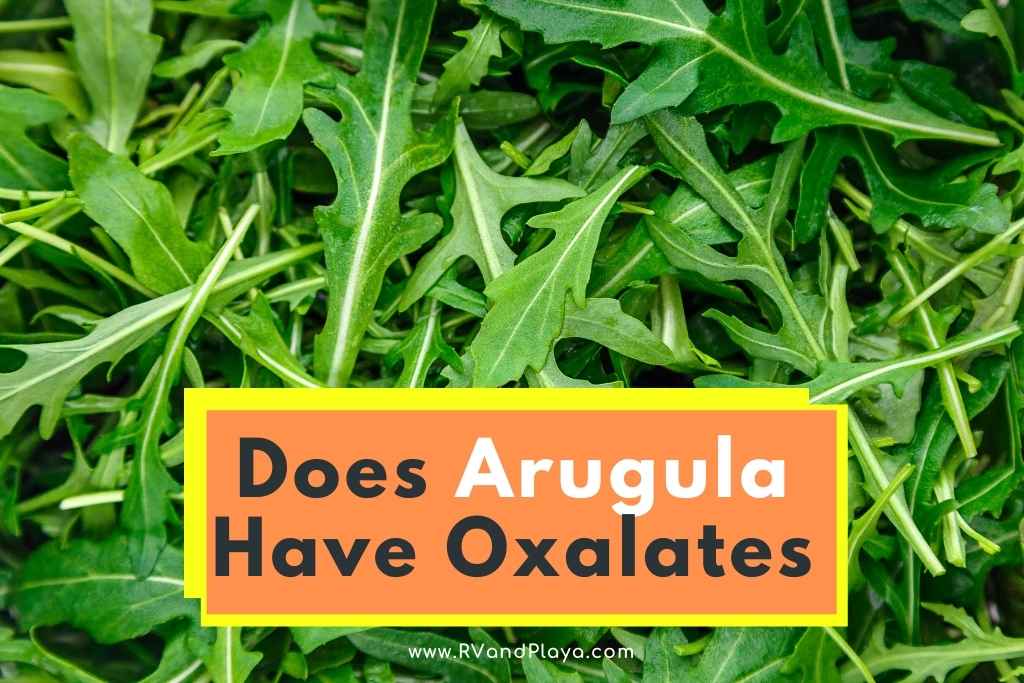Do you know if Arugula haveOxalates? this is one of the questions our readers ask a lot. Well, we´ve got you covered.
While oxalates are found in foods that are good for our bodies, some people should avoid them. In this article, we’re looking at how many milligrams of oxalate there are in arugula vs. other leafy greens.
So, does Arugula have Oxalates? Yes, Arugula contains oxalates, but in smaller quantities than some other leafy greens, such as spinach. Oxalates, or oxalic acid, are something we ingest through the foods we eat. Legumes and leafy green foods are often high in oxalate.
You’ll learn why it’s important for some people to limit their intake of oxalate, as well as what’s good about it.
So, keep reading to learn more about oxalates, arugula, and how they affect your health.
Table of Contents
Does Arugula Have Oxalates?
Arugula does have oxalates. The really great news is it has enough oxalates to provide your body with plenty of nutritional value but not so many that a portion of the nutrients gets stripped away.
Too many oxalates will strip your body of vitamins and minerals by clearing them away with waste.
How Much Oxalic Acid Is in Arugula?
Arugula has a relatively low amount of oxalate when compared to other foods that contain it. For instance, let’s look at a comparison of arugula and spinach.
You’ll get 0.7 milligrams of oxalate from 10 grams of arugula, while 10 grams of spinach has around 100 milligrams of oxalate.
So, what does this mean for you? Spinach has been on the list of healthy foods we should eat for a long time. But is it healthier for you than arugula? Maybe not. Read on to find out why.
What Happens if You Take in Too Many Oxalates?
Oxalates are found in foods that provide a lot of healthy benefits. However, they can also steal some of the benefits you would otherwise get from various vitamins and minerals in the food you eat. Oxalate is sometimes referred to as an antinutrient.
Oxalates can bind themselves to minerals like calcium and iron found in leafy greens. If and when that happens, your body cannot use the minerals the way it normally would.
It can’t absorb the minerals because the oxalate blocks the absorption.
What’s more is, the minerals simply get flushed out of the body with the waste it produces. Basically, oxalates are capable of stripping your body of nutrients it would otherwise get to absorb and use.
What Are the Benefits of Oxalate?
Oxalate itself isn’t what provides the true benefit to your health. Foods that are high in oxalate are often full of other useful nutrients.
They often have high levels of calcium, iron, magnesium, and other minerals. Thus, foods high in oxalate are mostly considered as part of a healthy diet.
Do Oxalates Cause Health Issues?
High-oxalate diets may cause health issues for some people. Oxalate binds to minerals and synthesizes, forming compounds.
The compounds turn into crystals. Most of these crystals will flush out of the body through urine or stool. When they don’t, they can wreak havoc.
Oxalic Acid and Kidney Stones
There is a link between oxalic acid and kidney stones. Oxalate binds with calcium and crystallizes. Should the crystals become too large, they cannot be passed easily.
In some cases, there could even be cause for surgical procedures to remove them.
Are Low-Oxalate Diets Good for You?
Your body may be more sensitive to oxalates than others are. If you are prone to kidney stones, urinary tract infections, or bowel discomfort, you may have a sensitivity to oxalate.
You may be able to eliminate a lot of your issues or discomfort by eating a low-oxalate diet.
Arugula is a low-oxalate food. It offers much of the nutrients you can get from spinach and other leafy greens but with a small fraction of the oxalic acid.
You can, essentially, replace spinach with arugula anywhere you would normally use it. You’ll get the vitamins and minerals you need and much less oxalate.
Your body may actually get more nutrition from arugula than leafy greens with high oxalate contents, even if those greens have more nutrients.
This is because of the binding that oxalate does with the minerals. The oxalates often bind with a lot of the minerals in the foods and flush them out of the body.
What Foods Are High in Oxalate?
We mentioned above that many foods high in oxalate are healthy. Here are some that top the list of high-oxalate foods:
- Spinach
- Almonds
- Beets
- Soybeans
- Navy beans
- Potatoes
- Dates
- Raspberries
These are foods that are not recommended for a low-oxalate diet regimen.
What Foods Are Low in Oxalate?
If you are looking to try out a low-oxalate diet, here are some foods you can add to your grocery list:
- Pumpkin seeds
- Kale
- Broccoli
- Blueberries or blackberries
- Boc choy
- Kidney beans
- Sunflower seeds
- Sweet potatoes
- Dried figs
- Cashews and walnuts
You can also replace spinach with arugula, as was mentioned above. You can still eat some of the high-oxalate foods from the first list, but in moderation.
Final Thoughts
Arugula is a leafy green that has oxalates but in low concentrations. It’s a good alternative to spinach for recipes, in salads, or as a topping on sandwiches, pizza, tacos, or other foods.
Oxalate is considered an antinutrient because it can bind to healthy minerals and pull them out of the body.
It can also cause health issues by forming crystals that are too big to be eliminated with waste. While oxalates are fine in moderation, they can be detrimental to your health and well-being in high quantities.
Here are some of my favorite services, products, and Stores
There are affiliate links, so if you do decide to use any of them, I´ll earn a small commission. But in all honesty, these are the exact what I use and recommend to everyone, even my own family.
To see all my of most up-to-date recommendations, check out this resource that I made for you!
+ Products & Services
+ Convenience Stores
+ Save Thousands of Dollars
References
https://www.webmd.com/diet/foods-high-in-oxalates
https://www.healthline.com/nutrition/
Recent Posts
Have you ever asked yourself or your friend if tocopherols are low fodmap? Well, you are at the perfect place to find the answer to such a question. The Low FODMAP diet, commonly used to treat...
Have you ever asked yourself or your friend if Pectin is low Fodmap? Well, you are at the perfect place to find the answer to such a question. Pectin is a well-known plant-based fiber that offers...


